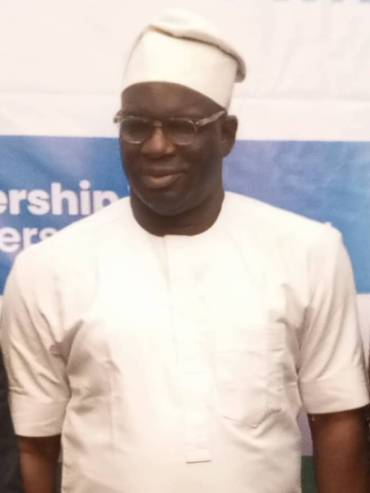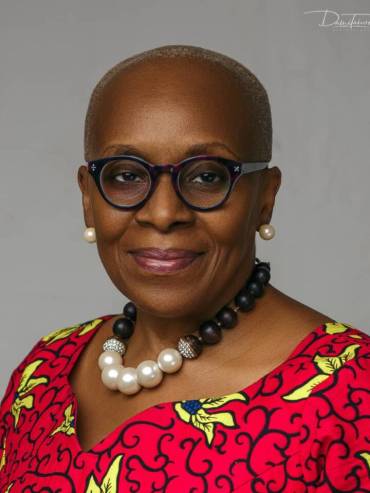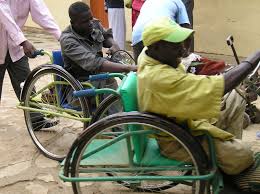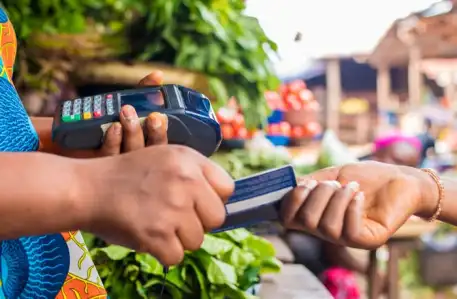Maya Olude, a vibrant woman with a visual impairment is a skilled seamstress, she runs her own small business from home. She cannot read text messages on her phone or navigate its complex menus.
To access money for her daily business, Maya must embrace digital payments like mobile wallets, online banking, and QR codes.
In the meantime though she often uses the ATMs, but that comes with challenges – small buttons and bright screens.
She is forced to rely on others, compromising her independence and financial privacy.
Maya’s struggles are not unique. Millions of Nigerians with disabilities face similar barriers.
Blind individuals cannot access websites without screen readers, those with motor impairments find touchscreens frustrating, and those with cognitive disabilities struggle with complex financial interfaces.
But Peter Ihuoma, another visually impaired individual who relies on assistive technology, despite his determination, he encounters numerous hurdles when making online transactions.
Websites and mobile apps often lack essential features like screen reader compatibility and voice commands, leaving him frustrated and unable to complete simple tasks like paying bills or transferring money.
Similarly, Mr. Lukman Salami, Chairman of the Nigerian Association for the Blind, shared an experience with Daily Sun.

When renewing his ATM card at a First Bank branch in the University of Lagos (UNILAG), he was required to sign an indemnity form appointing someone else to operate the ATM on his behalf.
He questioned why banks punish visually impaired customers for their failure to implement accessible technology like speech-enabled ATMs. “It is not about our inability,” he said. “It’s about the bank’s failure to innovate.”
“This is not just a technological issue, it’s a matter of human rights and social justice. We have the tools to create a more inclusive digital world, accessible interfaces, voice commands, and tactile feedback. It’s time to break down the barriers and empower everyone to participate in the digital age,” Salami said.
The impact of the exclusion
These experiences are not isolated but reflect systemic gaps that force people with disabilities to rely on others, robbing them of financial independence and reinforcing the notion that they are a burden.
The consequences of this digital divide are far-reaching. People with disabilities are more likely to experience financial hardship, struggle to access essential services, and face social isolation.
This exclusion perpetuates a cycle of inequality, hindering their ability to live fulfilling lives and manage their finances independently, pay bills online, or participate fully in the digital economy. They become vulnerable to exploitation, and their economic potential is stifled.
Digital divide
In today’s increasingly digital world, access to digital payment systems has become essential for daily life. However, Nigeria faces a significant challenge in ensuring digital inclusion for all its citizens, especially those living with disabilities.
This digital divide exacerbates the challenges faced by individuals with disabilities.
Many digital platforms and services are not designed with accessibility in mind, making it difficult for people with visual, auditory, or motor impairments to navigate and utilize them effectively.
Approximately 15% of Nigeria’s population lives with a disability, according to the World Health Organization (WHO).
A rapid social assessment revealed that persons with disabilities lack access to basic services and face significant barriers to socioeconomic inclusion. Inclusive policies are either absent, weak, or poorly implemented.
Many ATMs and POS machines are not designed to accommodate individuals with physical or sensory impairments. Keyboards may be inaccessible to wheelchair users, screens may lack sufficient contrast for those with visual impairments, and audio guidance systems may be absent or inadequate. Consequently, individuals with disabilities often rely on others for financial transactions, leading to dependency and potential exploitation.
The limited availability of accessible ATMs and POS machines has severe consequences for persons with disabilities. They may be unable to independently withdraw cash, deposit checks, or pay bills, limiting their financial management capabilities. This financial exclusion can perpetuate poverty and social isolation, further marginalizing an already vulnerable population.
Experts opinions
Experts and advocates are calling for urgent action to address this issue. They emphasised the need for inclusive design principles to be adopted by financial institutions and technology companies, ensuring that digital payment systems are accessible to everyone, regardless of their abilities.
Mr. Adeola Aina, Vice Chairman of the Association for the Blind in Nigeria, described the frustration many visually impaired individuals face when navigating the banking system. He noted that digital platforms designed for convenience are often inaccessible to people with disabilities (PWDs).
For visually impaired individuals, USSD banking services, a widely used tool, pose significant difficulties. The service’s time constraints and non-speech-enabled token systems are particularly problematic, requiring them to pay for alternative token services that still don’t offer independence.
Aina highlighted the pervasive issue of inaccessible digital banking tools: “Internet banking is a nightmare for us. While some banks have somewhat accessible apps, it’s more by chance than by design.
“A survey we conducted across 10 banks supports this claim, revealing that most mobile apps remain unusable for PWDs due to poor design, lack of button labels, and incompatible built-in accessibility features like speech capabilities. Additionally, the increasing reliance on facial recognition further alienates visually impaired users.”
Aina continued, “The exclusion extends to those with other disabilities as well. For instance, individuals with albinism struggle with poor color contrasts in mobile banking apps, while wheelchair users often find ATM machines inaccessible.”
Aina proposes involving PWDs as testers in digital platform development to identify accessibility issues early. He also advocates for speech-enabled ATMs, citing their successful implementation in other countries.
Professor Chiso Ndukwe-Okafor, Executive Director of the Consumer Advocacy and Empowerment Foundation (CADEF), is pushing for inclusive financial systems.

Speaking to Daily Sun, she said CADEF, in partnership with Consumers International, has trained over 80 PWDs in digital financial literacy, a vital step toward ensuring that PWDs are not further marginalized in the digital age.
Ndukwe-Okafor emphasized that partnerships between the public and private sectors are crucial in driving real cchange
Campaign for accessible tech
Mr. Opeodu Akinola, an expert on tech accessibility for PWDs with Accesstech, corroborated this, stating that the barriers PWDs face are both physical and psychological.
Akinola highlighted the need for financial institutions to adopt a universal design approach in their product development and service delivery.
He emphasized the importance of universal design as a cornerstone for ensuring equal access to financial services for all Nigerians. “Universal design means creating products and services that are usable by everyone, regardless of their abilities. By embracing this principle, financial institutions can ensure that people with disabilities have the same opportunities to access and utilize digital financial services as their peers,” he said.
The expert emphasized that implementing universal design is not only a moral imperative but also a sound business decision. “Studies have shown that inclusive financial services can lead to increased customer satisfaction, loyalty, and revenue. By catering to the needs of people with disabilities, financial institutions can tap into a vast and underserved market segment,” Akinola explained.
Adeniyi Bunmi, Senior Manager at the Central Bank of Nigeria (CBN), acknowledged the importance of addressing the financial exclusion of PWDs. She stressed the need for alignment between disability groups and financial institutions to meet Nigeria’s 95 percent financial inclusion target.
In his response to Daily Sun, Jide Awe, Science Technology and Innovation policy advisor and founder of Jidaw Systems Limited, acknowledged people with disabilities in Nigeria face significant challenges in using digital payment systems. He said this has serious implications for both the individuals affected and the country’s economy.
“These barriers effectively deny individuals with disabilities their financial rights as citizens. Unable to fully participate in the nation’s financial system, they are excluded from a system that should be for everyone. This exclusion prevents them from saving, investing, transacting, and participating in the digital economy. It makes them rely on others to access financial systems, which expose them more to cheating and exploitation.”
Awe argued that the exclusion is not just a loss for the individuals but also economy and the country as a whole. “By excluding people with disabilities, we are unable to benefit from their potential contributions to the digital economy. We are more or less forcing these individuals to live far below their potential. As with all forms of digital exclusion, this limits the nation’s ability to fully harness its economic potential. When a significant portion of citizens cannot contribute to or benefit from the digital economy, we are not operating at full capacity. Instead of tapping into their abilities, we inadvertently turn them into dependents. This is an added and unnecessary burden in an era that demands agility, speed, and inclusion”, he said.
He added that this exclusion shows a systemic failure that reflects not only a lack of innovation and inclusivity but also a failure to recognize the immense potential people with disabilities can bring to the financial system and the nation.
The solution
To address this issue, financial institutions and policymakers must prioritize accessibility in the design of ATMs and POS machines. This includes incorporating features such as: lowered keypads and card readers, tactile buttons and braille labels, audio guidance systems, clear and concise instructions on screens.
By doing the above, financial institutions can empower persons with disabilities to take control of their finances and participate fully in the digital economy.
As Awe puts it, “Creating a more inclusive financial system and economy must be a priority. “Regulators need to adopt innovative and inclusive mindsets to promote digital accessibility within the financial system in effective and creative ways. These inclusive approaches should be encouraged.
Governments should work closely with relevant stakeholders, including financial institutions, technology companies, and disability groups, to develop meaningful digital financial inclusion policies that address the specific needs of people with disabilities. Such collaboration is also essential to ensure the innovative design of inclusive digital financial solutions that incorporate their unique requirements.”
He said availability and creative use of appropriate technology tools, interfaces, and integrations are critical. “Leveraging established and emerging technologies, such as Artificial Intelligence (AI) and the Internet of Things (IoT), to enhance accessibility should be actively explored. Furthermore, everyone in the financial industry must follow international accessibility standards. Legal approaches to protect people with disabilities and promote inclusion should also be made.”
However, the tech expert said policies alone are not enough. “Implementation and impact measurement are crucial. Regular monitoring allows stakeholders to identify what works and what needs to improve. An inclusive approach to data collection and monitoring—one that involves people with disabilities—is essential.”
He added that digital literacy initiatives are equally important to empower people with disabilities to participate and contribute to the digital economy. “Training programs should focus on helping them use the digital environment of smartphones, apps, social media and digital payment systems not just to participate but to add value and live their dreams.
“Most importantly, policymakers, the technology sector, academia, and the public must work together to champion the creation of accessible systems and advocate for digital and financial inclusion. Innovation in assistive technologies should also be actively promoted and supported. Recognizing and rewarding individuals and organizations for impactful digital payment accessibility initiatives is an effective way to encourage progress.
Additionally, highlighting success stories where accessibility has driven inclusion and innovation helps to create awareness and inspire further efforts”, Awe pointed out.
“This report is produced under the DPI Africa Journalism Fellowship Programme of the Media Foundation for West Africa and Co-Develop.”





